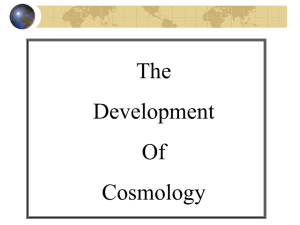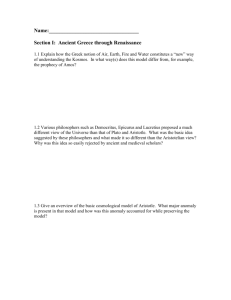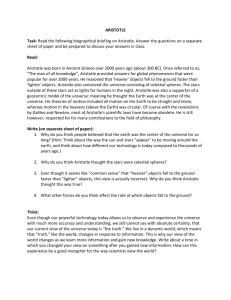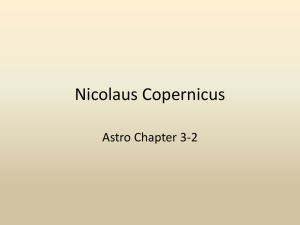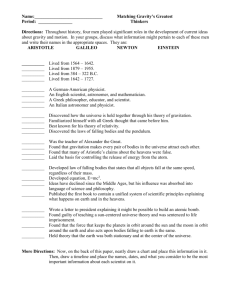Natural Law - the Diocese of Leeds
advertisement
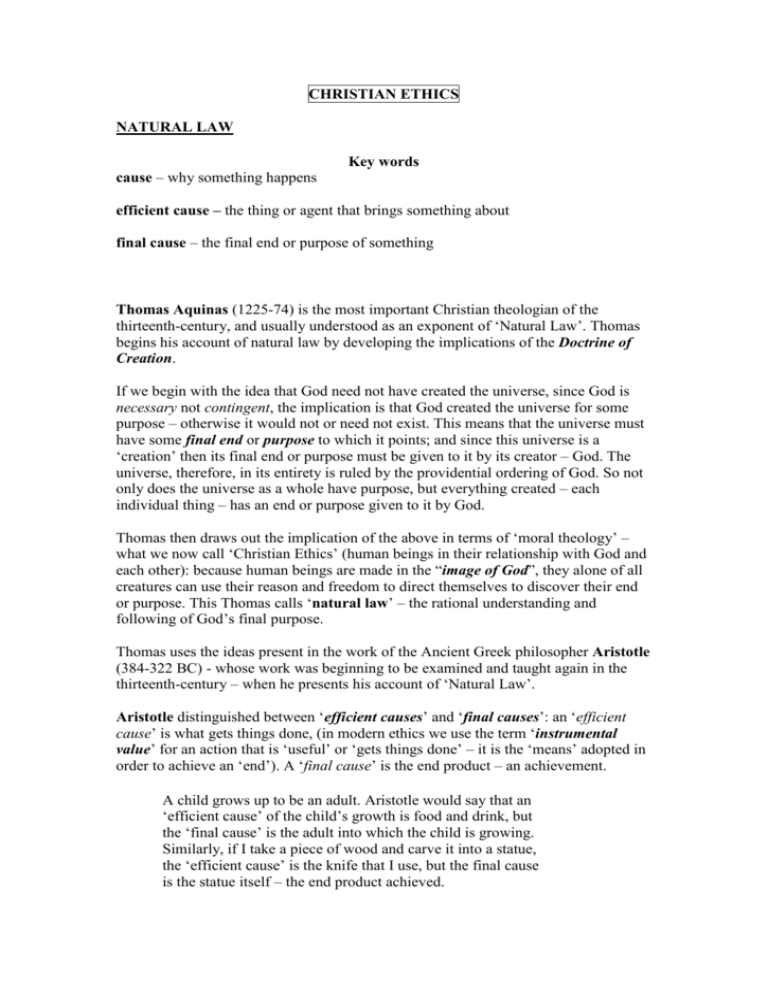
CHRISTIAN ETHICS NATURAL LAW Key words cause – why something happens efficient cause – the thing or agent that brings something about final cause – the final end or purpose of something Thomas Aquinas (1225-74) is the most important Christian theologian of the thirteenth-century, and usually understood as an exponent of ‘Natural Law’. Thomas begins his account of natural law by developing the implications of the Doctrine of Creation. If we begin with the idea that God need not have created the universe, since God is necessary not contingent, the implication is that God created the universe for some purpose – otherwise it would not or need not exist. This means that the universe must have some final end or purpose to which it points; and since this universe is a ‘creation’ then its final end or purpose must be given to it by its creator – God. The universe, therefore, in its entirety is ruled by the providential ordering of God. So not only does the universe as a whole have purpose, but everything created – each individual thing – has an end or purpose given to it by God. Thomas then draws out the implication of the above in terms of ‘moral theology’ – what we now call ‘Christian Ethics’ (human beings in their relationship with God and each other): because human beings are made in the “image of God”, they alone of all creatures can use their reason and freedom to direct themselves to discover their end or purpose. This Thomas calls ‘natural law’ – the rational understanding and following of God’s final purpose. Thomas uses the ideas present in the work of the Ancient Greek philosopher Aristotle (384-322 BC) - whose work was beginning to be examined and taught again in the thirteenth-century – when he presents his account of ‘Natural Law’. Aristotle distinguished between ‘efficient causes’ and ‘final causes’: an ‘efficient cause’ is what gets things done, (in modern ethics we use the term ‘instrumental value’ for an action that is ‘useful’ or ‘gets things done’ – it is the ‘means’ adopted in order to achieve an ‘end’). A ‘final cause’ is the end product – an achievement. A child grows up to be an adult. Aristotle would say that an ‘efficient cause’ of the child’s growth is food and drink, but the ‘final cause’ is the adult into which the child is growing. Similarly, if I take a piece of wood and carve it into a statue, the ‘efficient cause’ is the knife that I use, but the final cause is the statue itself – the end product achieved. On this theory, everything can be made sense of through a causal sequence of efficient and final causes. On the one hand, we can examine a sequence of efficient causes that brings about a particular purpose or end. On the other hand, efficient causes give us no sense of the overall picture – it offers no complete explanation – no overall purpose or end. For Aristotle, everything must have a final ‘good’ which was achieved by fulfilling the purpose for which it was designed – its ‘final cause’. Every object and every action, then, has some final meaning or purpose (its ‘final cause’) and this is what determines its ‘good’. If we understand what that ‘good’ is, we will know what we need to do in order to achieve it. Thomas Aquinas used this idea to argue that the world was created by God, and that everything should therefore have God’s ultimate purpose as its final ‘end’ or ‘good’. Each individual thing had a design or purpose (in other words, its ‘final cause’) and to understand God’s will for it , and therefore what is ‘right’ for it, you only have to look at the purpose for which it has been made and fulfil that purpose. Task Key Idea: in terms of Natural Law, the ‘final cause’ of something determines if an action is right or wrong A.). Consider the act of heterosexual intercourse. Q1. What is its ‘final cause’? Q2. What are its ‘efficient causes’? Q3. If it is the ‘final cause’ that determines if something is right or wrong, then strictly speaking, in terms of heterosexual intercourse, what things are against natural law (i.e. wrong). B.). Consider the following moral problems and provide arguments against them using the principle of Natural Law; i. ii. iii. abortion embryo research voluntary euthanasia
